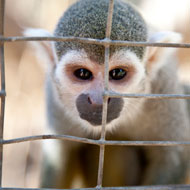Update on primates as pets inquiry

RSPCA and BVA support a UK ban on keeping primates as pets.
The Government has published its response to calls for independent research into the number and type of primates being kept as pets in the UK, among other recommendations.
In December last year, an inquiry was launched into primates being kept as pets in the UK. Many organisations, including the RSPCA and BVA, support a ban on private individuals keeping primates as pets, due to the difficulty in meeting their welfare needs.
In a report published in June this year, the Environment, Food and Rural Affairs (Efra) Committee called for Defra to commission independent research to find out the scale of the UK's pet primate trade.
Responding on September 12, the Government said it "does not consider it would be the best use of public resources, which need to be prioritised, to undertake independent research on the number and type of primates being traded and kept as pets in the UK."
Whilst agreeing that estimates vary regarding the number of privately kept primates, the Government said there is no evidence to suggest that the higher estimates are correct. Evidence given by Andrew Greenwood of the British Veterinary Zoological Society states that the number of primates kept as pets in the UK is "probably fewer than 1,000", whereas estimated figures go as high as 9,000.
Efra Committee recommended a review of the Pet Animals Act 1951 to ensure it remains fit for purpose in the age of the internet. While the Government said the act still provides appropriate protection, Defra will be working with the Pet Advertising Advisory Group to encourage advertisers to adhere to its minimum standards for advertising pets for sale online. Among other things, the standards state primates should not be advertised for sale.
In the June report, MPs also recommended Defra issue local authorities with guidance on implementing the Dangerous Wild Animals Act 1976 without delay. Defra says it will ensure the guidance is published within the next 12 months. As recommended by the committee, the guidance will refer to the potential use of zoo inspectors or vets for accommodation inspections involving primates, prior to licenses being granted or renewed.
In addition, Defra has agreed to consider fully the committee's recommendations that a review of the Primate Code begin with immediate effect, ensuring the code is clear, precise and easy to enforce, and includes species-specific appendices. It also advised that the code's standards be raised to the level of zoo standards and cover all life stages, including breeding and transport.
For the full Government response, visit: http://www.parliament.uk/business/committees/committees-a-z/commons-select/environment-food-and-rural-affairs-committee/news/primates---government-response-pub/



 The latest
The latest